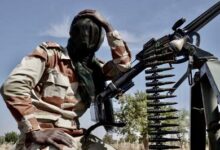
Activists demanding the exit of Sudan’s President Omar al-Bashir say a soldier has been killed while attempting to protect anti-government protesters from security forces trying to break up a rally in front of the leader’s residence.
In an apparent escalation of the four-month calls for political change, demonstrators in the capital, Khartoum, held a sit-in on Monday for a third straight day outside the complex, which also houses the headquarters of the Sudanese army.
Forces belonging to the widely-feared National Intelligence and Security Service used tear gas, rubber bullets and live ammunition in a bid to disperse the protesters, according to the Sudanese Professionals Association (SPA), one of the groups spearheading the demonstrations.
Activists told the Associated Press news agency a soldier was killed yesterday while trying to protect those rallying against Bashir.
Speaking to Al Jazeera from Britain’s capital, London, SPA spokeswoman Sara Abdeljaleel said other army officers had also tried to defend the demonstrators yesterday and during previous clashes between civilians and the security services on Saturday and Sunday.
“We keep asking for the army to protect this revolution and keep it peaceful,” she added.
Later yesterday, Interior Minister Bushara Juma said seven people were killed and 2,496 arrested during demonstrations in Khartoum and elsewhere over the weekend.
The latest deaths take the overall toll to 38 since the protests began, according to officials. Human Rights Watch says more than 50 people have been killed, including children and medics.
Protesters in recent days have been appealing for solidarity with the military, shouting slogans such as “Sudan is rising, the army is rising” and holding placards reading, “The army and the people are one” to encourage soldiers to back their demands.
The protesting Alliance for Freedom and Change group yesterday, called on the army to hold direct talks with demonstrators about “forming a transitional government”.
The demonstrations against the 75-year-old president were sparked by a government decision to triple the price of bread in December, but quickly escalated into broader protests against Bashir’s three-decade rule.
In response to the nationwide protests, Bashir in late February imposed a state of emergency which led to the protests largely being confined to Khartoum and Omdurman, the capital’s twin city.
But the movement now appears to have entered a critical new phase after the organisers last week urged protesters to take to the streets on Saturday, which marked the 34th anniversary of the overthrow of the government of Jaafar al-Nimeiri.
In Khartoum, the rally saw anti-government protesters reaching the army headquarters for the first time since the demonstrations erupted.
SOURCE: AL JAZEERA AND NEWS AGENCIES





